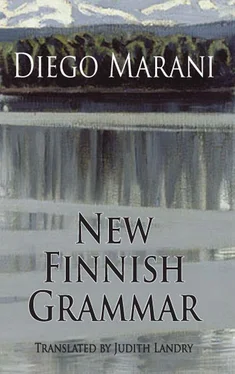‘In march time, and till dawn?’ she asked, suddenly playful. ‘Till dawn!’ I answered, getting up and pulling on my jacket. Drunk with an exhilaration I had never known, I let the words slip from my mouth careless of where they might lead me, although I sensed it might be far.
Ilma’s face had lit up. The delicate sprinkling of freckles on her cheeks and cheekbones looked sharper, warmer, her expression suddenly unguarded, and a strange sense of reserve caused me to look away. I realized, then and there, that something was happening which I did not want to happen.
‘Wait for me outside,’ she said, pushing back her chair. Looking back through the ice-clad window pane I saw her rejoin her fellow-singers at the table, where her outline merged with the rest. There on the silent street the biting cold brought me to my senses: I felt unreasonably bothered, I wanted to run, to disappear back into my solitude, which now seemed both troublesome and comfortable, like some non-life-threatening disease. Now the very thought of even the most tenuous link between myself and that young woman filled me with dismay. How could I have yielded to such easy temptation? It must have been the alcohol. I was suddenly sickened by the idea of that unknown presence beside me, demanding warmth and care. I would be required to take an interest in another life and all its petty doings, to feign concern for a person who was nothing to me, to share my anxieties with someone else and agree to lower my gaze to meet their own. Above all I would have to listen — listen to someone else’s story, sympathize, mull over their feelings, be dragged into sufferings not my own, though I would have to serve as comforter; have that face before me each day, pleading for understanding, pity, help; promising me joys I do not seek, affection I do not want to give. See my time merge, my boredom fuse, with hers; smell her smell on my clothes, pick out her shape along the street; sleep in her bed and wake up each morning, always the first, alone in the grey light, waiting for another endless day to start — to be spent with her, to be dragged out of silence by force and carried in my heart till evening, until the moment when darkness would return to drown out our solitude, both mine and hers. The idea was abhorrent to me. I was repelled by the way all those around me clung so doggedly to life, the way they were born again beneath the ruins, instantly rebuilding what the bombs had flattened, in the grip of that unquenchable desire to be brought back to life which is the scourge of the human race. My own instinctive desire was to get through such life as remained to me without sullying myself, with the least possible damage and the least involvement. Because mine was no longer a life, but a leftover, some leavings I had picked up along the way. To rediscover my true past was an impossibility; to seek out a future, a huge effort. Doctor Friari was right: language is our mother, and it is through language that we come into this world. But I had lost both, forever; to me, rebirth was denied. The best that I could do was to live out the remainder of the life I had as one smokes the last bit of a cigarette, in a hurry to get it over, already looking around for somewhere to throw the butt-end. Determined to avoid forging that dangerous link, I was about to walk off towards the darkness of the Esplanadi, but Ilma was already beside me; she placed her arm on my blue jacket, and I instinctively took it.
It was no longer snowing. The wind blowing in from the sea was now less cold. It smelled of seaweed, but also of resin: as though, on its journey from the open sea, before reaching the city it had become lost in the woods, soaking up the smell of the earth. The Esplanadi was deep in snow, its course marked only by two rows of bare trees.
When we reached the Mannerheimintie, it was dark and deserted; the great dark shapes of the buildings loomed above it, many with their windows still glued with strips of protective tape. We passed a group of soldiers, but fortunately they immediately turned off into the Aleksanterinkatu; perhaps they had just come out of the Capitol. They were talking loudly and walking at a fair pace, and we were irritated by the racket. But soon they were out of hearing, and we were plunged once more into the silence of the great avenue, streaked with tyre marks on the dirty snow. We turned into the Bulevardi and walked towards the sea. Ilma was walking in silence, but I thought I could catch the drift of her thoughts; she was working out what she was going to say. I looked at the sky, above the tangle of bare branches: it had a strange glow to it. Somewhere up there a wind must have been blowing; the odd gust made its way down among the trees, dislodging the snow from the branches. I could see the clouds fraying and whitening in the pale light of stars too distant to have any resonance.
‘Now we can sing!’ said Ilma in a whisper.
It was too dark to see her face, and I felt nothing but relief that she could not see mine. We walked faster as we sang, picking our way between heaps of snow-covered rubble, along the dismal road suddenly enlivened by our song. The city lay around us, motionless, crouched like a hunted animal. Disembodied and brazen, our voices were dashed against the walls, falling back upon us in fragments. What with the singing and the marching, I was soon out of breath; but the more I sang, the emptier my head became. At the end of each verse Ilma would remind me of the words of the next. I followed her as best I could, and I felt as though I were marching towards the front, towards the Russian batteries hidden beyond the horizon; or towards that battlefield which I myself had become. Hearing me flounder over some difficult word Ilma would laugh, tightening her grip upon my arm, and it was by that arm that I felt clamped to the life I had decided to clutch at; that life I had so often seen flowing at my feet without finding the courage to leap into it, to wallow in it, like the rest. Now I was allowing myself to be dragged along, into song and down that street, away from loneliness, away from silence; away from myself.
When we reached the shores of Hietalahti Bay, we came to a stop; it was so quiet that you could hear the fat raindrops falling from the trees; and I too was a raindrop, I too was a tree. I was the snow, and I was no longer frightened of melting, of running down the streamlets into the sea, to merge with the relentless march of all that is endlessly transformed and never dies. For the first time I had found the courage to leap out of my beleaguered consciousness and mingle with something different from myself. I had gone down into the slime of life, my feet experiencing its disagreeable consistency. My awareness of this careless intermingling made me at once euphoric and dismayed: I had become vulnerable. My fragile memory, hothouse-reared, kid-glove tended, now lacked all protection; now parasites and mould could attack and destroy all that had cost me so dear to nurture. Now that I was alive, I might also die. A door had opened up before me, and it filled me with foreboding: to go through it meant steeping myself in life, letting each cell merge with millions of others, becoming part of that chaotic brew of organisms which is life, where the individual is insignificant and life and death are mere moments, ways through towards some other place, some point in the universe where everything is rushing headlong — to disappear. On the one hand I was drunk on that new sensation of surrender and belonging, on the other I was alarmed by the idea of losing control of my individuality. I regretted that I would never be able to go back to that freezing evening when I had gone into the Kämp and sat down among those soldiers with their unknown uniforms.
‘It’s starting to thaw,’ said Ilma, pausing to listen. She looked around, narrowed her eyes and added: ‘Can you hear, the wind has changed? It’s coming from the sea.’
Читать дальше












